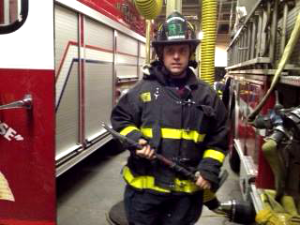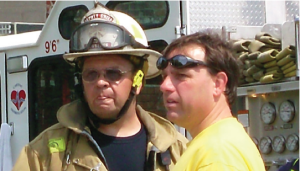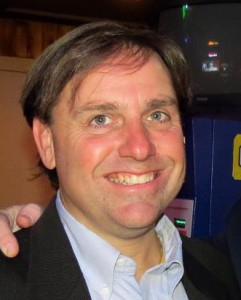
The Lawrence Fire Dept.
By: Tom Duggan – February, 2014
This is part II of an ongoing series on Lawrence City Councilor Marc Laplante’s experiences riding along and observing city workers.
Last month we let Councilor Laplante chronicle his experiences riding along with Lawrence Police. This month, the councilor talked about what he learned observing the Lawrence Fire Department, as well as Fire Alarm dispatch center.
“The first thing that struck me was how there’s a whole fraternity at the Lawrence Fire Department,” Councilor Laplante says of his experience.
“They bust on each other and give each other a hard time, but when that call comes in they stop whatever they are doing, dead in their tracks, all the fun stops, and they are all business. There’s a seriousness to these guys on every call, even though most of the calls they go on are false alarms or non-emergencies.”
“It’s s a testament to the rigorous training they go through.”
“The day I spent with the Lawrence Firefighters was the day of the big Monmouth Street fire, so these guys were obviously very tired after nine hours without eating. Then another call came in before they had dinner, nobody was complaining, it was just an automatic response to go out and handle another emergency. When they had to go out again they just went out.”
“I don’t know the exact number, but from talking to the guys they say about 90% of the calls they go on are false alarms or non-emergencies. This is a really big problem for a city like Lawrence.”
“After observing the amount of time and resources the city spends on false alarms, I think we need to have a city ordinance to deal with the repeat offenders. If there are two or three false alarms in a calendar year, then we should be fining those individuals or businesses.”

“The Fire Department already has the authority to issue citations to people for various safety infractions.”
“Time is of the essence in any kind of emergency if they are tied up on a false alarm they can’t get to a call that might be life and death, or the difference between minimal destruction of property and a total loss.”
Laplante suited up in firefighter gear and went out on calls, with his first few being the Arlington School, The Boys Club on Water Street and a medical call at Merrimack Courts housing project.”
“There was an individual who had a hard time breathing and called in for 911 assistance. The first responders were the fire department. We were the first ones there. Then shortly after we arrived, the ambulance services arrived. I don’t think people realize our firefighters are people who respond to almost any kind of emergency. If you’ve got a natural gas leak, a flooding issue, medical emergency, even car accidents, they have training that goes beyond just fighting fires. And they are constantly training. When they have down time on a Sunday afternoon or when there’s not as many calls, they squeeze in additional training.”
“The firefighters in Lawrence take advantage of every minute they can to make sure they are as prepared as possible for any emergency.
“It really struck me, I was really impressed that there was a real family aspect with the firefighters.”
“They live together, eat together, and they are a real tight unit. Other than the military, I don’t know any other profession that has that group dynamic, that tight a knit group of people that live and work together so affectively.”
“I really appreciated them letting me into their family, essentially to see what they are doing and how they are doing it every day.”
FIRE ALARM DISPATCH
“I spent some time with the guys and gals at Lawrence Fire Alarm to see their operations. I was particularly interested in how they dispatch the fire crews.
“How it works is that when someone calls 911, it goes directly to the police dispatch. They decide if it is a fire or some type of emergency that the fire department needs to respond to. If so, they press a button and send the call directly over to fire alarm.”
“At the call center not everybody is bilingual. So, if you call in to 911 and you can’t speak English, the City of Lawrence uses a service that can do an immediate translation from Spanish to English so that the 911 call taker can understand exactly what the problem is. They press a button; the call goes to someone else who comes on the line to translate. So, if caller says in Spanish that someone has a gun at their door, the call service will translate to the call taker and they can get the emergency personnel to the location. It takes a little longer to get the information, but the service is provided and it seemed to work pretty well.
LaPlante said he thinks the city should change the requirement for call takers to mandate that they be bilingual in English and Spanish.
“You have really good people there now and I’m not saying I think we need to replace anyone, but moving forward when we hire new dispatchers, it should be required for new hires. It makes a lot of sense to make a policy for bilingual call takers. When I was observing, I didn’t see any problems with the way it is now. I want to make it clear they handled the task really well. But I can foresee a real potential problem where those extra seconds it takes to get the translator can mean life and death. I just don’t think we should be taking those kinds of chances.”
RESPONDING TO THE CALLS
LaPlante says that the dispatch system is automated. And has been in existence for about a year.
“They can press a single button to a particular fire house and an amplifier says there is a fire, the location and
whatever details they need. Meanwhile, firefighters are sliding down the polls to head to that location. They continue to get more information on their radios while on their way to the call, as dispatchers try to get more information from the 911 caller.”
“We are lucky to have so many great, dedicated, professionals in the city who really want to serve. For the most part, I witnessed that and couldn’t be more proud of the people who are working our city and making a difference.
Laplante said that the one thing the kept running through his mind while observing the firefighters was the weight of the gear he had to wear all night, and how difficult it must have been for the firefighters in New York during the Muslim attacks on September 11, 2001.
“When I put on all that equipment and all the gear, it was heavy, it was physically stressing on the body. I just kept thinking what it must have been like on 9/11 when those firefighters had to walk up all those stairs at the World Trade Center. They weren’t taking elevators; they were walking up stairs wearing all that equipment. And they knew what they were about to get themselves into. It gave me a fuller appreciation just wearing the gear.”
“It made me even more mindful and sad about the tragedy of that day. It makes me think of our own guys and gals; the next time they have to go into a tragic situation it might be … well… anything can happen. Sometimes we forget that, and we shouldn’t.”

